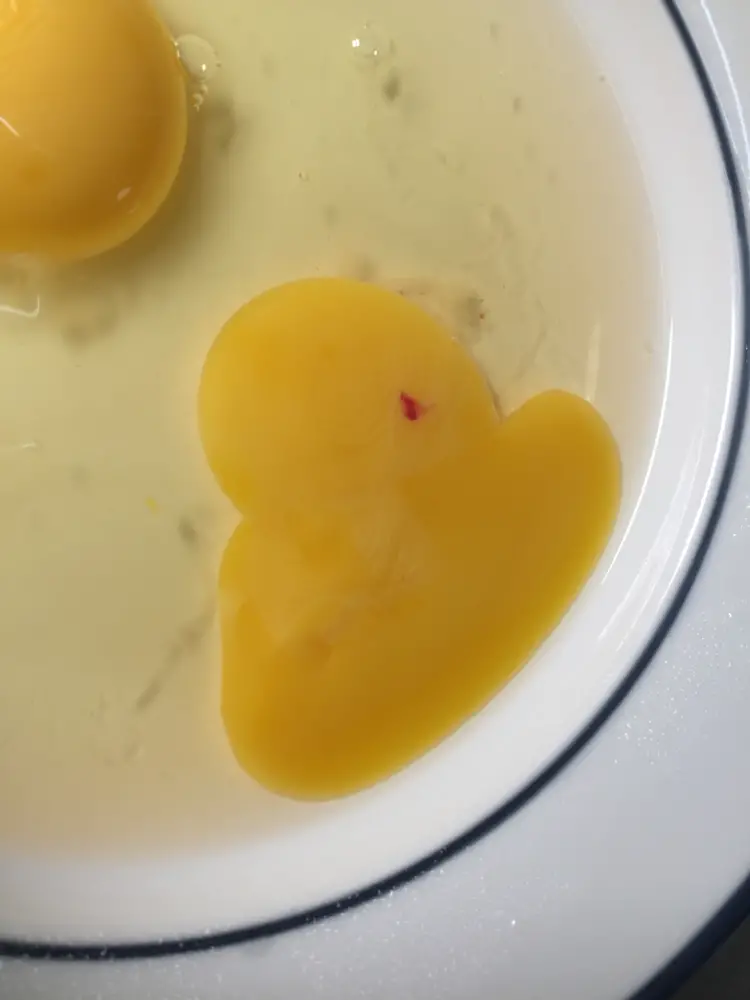A bloody egg is a result of a ruptured blood vessel during the yolk formation process, or in other words, the process was disrupted in one way or another. These blood spots in eggs are safe to eat and won't affect the baking or cooking process, and you won't even see them after cooking the eggs.
For many backyard chicken keepers, it can be alarming to see a spot of blood in a chicken egg, but this is generally safe for consumption.
Table of Contents
What Blood in Chicken Eggs Means
A bloody egg is a result of a ruptured blood vessel during the yolk formation process.

Each chicken egg has blood vessels that ultimately contribute to the lifeline of a developing embryo. However, even non-fertile chicken eggs have minute blood vessels that support the egg yolk.
If a blood vessel is ruptured during the egg formation process, then a blood spot will appear in the egg.
In other words, blood in an egg means that the egg formation process was disrupted in one way or another.
According to the USDA, farm-fresh eggs with red blood spots are safe to eat. If you don’t want to eat eggs with red spots, you can remove them with a spoon or the tip of a knife.
Source: USDA
These blood spots also do not affect the baking or cooking process. In fact, you won’t even see them after cooking the eggs.
On the other hand, blood on a chicken egg shell can mean different things. The most common reason for bloody eggs is a ruptured blood vessel in a young hen’s vent area. Other causes include mites, prolapse, and wear and tear caused by aging in old hens.
Reason Why Blood Is In Chicken Eggs
Blood in chicken eggs might be genetic, or it may be caused by chicken coop lighting in winter or a lack of enough vitamin A and vitamin K in a chicken’s diet.
Other more serious but rare causes include Avian encephalomyelitis or toxins or fungus in chicken feed.
Blood in chicken eggs occur when one or more blood vessels in the egg yolk bursts during ovulation.
But what is the cause of blood in chicken eggs? Here are the most common causes:
1. The Egg Formation Process
It is possible to find blood in chicken eggs because of the egg formation process.
When detaching from the ovary, the egg yolk can rupture blood capillaries. Once the capillaries break and the egg yolk gets detached, blood oozes and eventually coagulates. That’s why you find red spots in some egg yolks.
2. Lack of Vitamin A and Vitamin K
Most store-bought chicken’s diets are designed to offer proper nutrition to egg-laying hens. However, insufficient amounts of vitamins A or K has been linked to the breaking of blood capillaries, contributing to the appearance of red blood spots in eggs.
3. Deficiency of Biotin or magnesium
A hen’s diet might also have deficiencies in essential minerals like magnesium and biotin. This can cause hemorrhage inside the egg between the yolk and the chalazae.
4. Stress Triggers
Stressful situations like moldy or bad quality food, lack of fresh drinking water, a dirty chicken coop, disruptions or loud noises can disrupt the egg laying process.
5. Excessive Bright Light
Popular belief has it that red blood spots occur mostly in eggs laid by hens staying in coops with excessive bright light that is designed to increase egg production. In this case, the hens don’t get enough time of darkness to produce the melatonin levels they require.
Fertilization?
Some people also think that bloody eggs are already fertilized. This theory is wrong.
Firstly, laying hens are separated from roosters.
Secondly, the living environment in poultry farms hinders the proper hatching of fertilized eggs.
Thirdly, eggs are typically weighed and examined under a bright light to check the inside. All fertilized eggs are kept aside and not sold.
Again, these blood spots are harmless and can be easily removed with the tip of a knife or a spoon. They do not pose any health risk to consumers.
FAQs
Are blood spots in eggs dangerous?
The presence blood spots in eggs doesn’t mean you should throw them away. The American Egg Board assures consumers that those eggs are safe for consumers to eat.
Even if there are a lot of blood spots in an egg, simply remove them with a spoon or the tip of a knife and enjoy your breakfast.
Are blood spots in chicken eggs common?
It is quite uncommon to find eggs with spots of blood in the yolk. In fact, the incidence of blood spots and meat spots in chicken eggs laid in today’s commercial settings is less than 1 percent.
One factor that determines the presence of blood spots in eggs is egg color.
The frequency of occurrence of such spots is just 0.5% in hens laying white eggs, as compared to roughly 18% in those that lay brown eggs. Young hens just starting to lay eggs and older hens just about to stop laying tend to produce more eggs with blood spots.
Poorly balanced diets and stress factors might also boost the chances of getting eggs with blood spots.
What about white spots on yolks?
If you keep roosters, it’s possible to find chicken eggs with a bullseye or a white spot in the egg yolk. This white spot occurs in fertilized eggs and is the DNA of the rooster involved. These eggs are also safe to eat.

